Revision of Unit3课件2023-2024学年人教版九年级英语全册(共46张PPT)
文档属性
| 名称 | Revision of Unit3课件2023-2024学年人教版九年级英语全册(共46张PPT) | 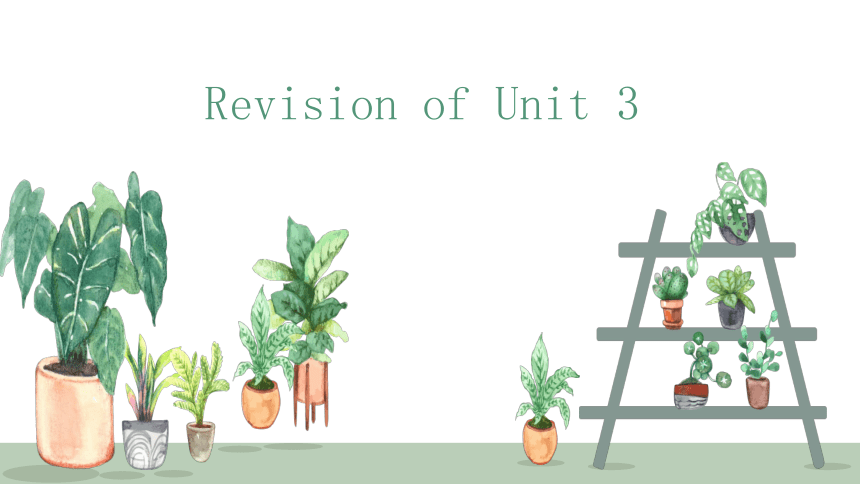 | |
| 格式 | pptx | ||
| 文件大小 | 2.7MB | ||
| 资源类型 | 教案 | ||
| 版本资源 | 人教新目标(Go for it)版 | ||
| 科目 | 英语 | ||
| 更新时间 | 2023-09-19 06:42:31 | ||
图片预览

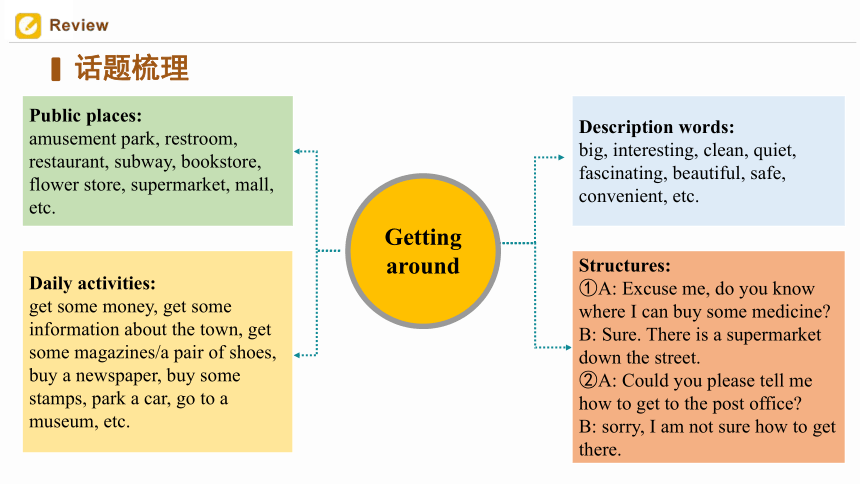

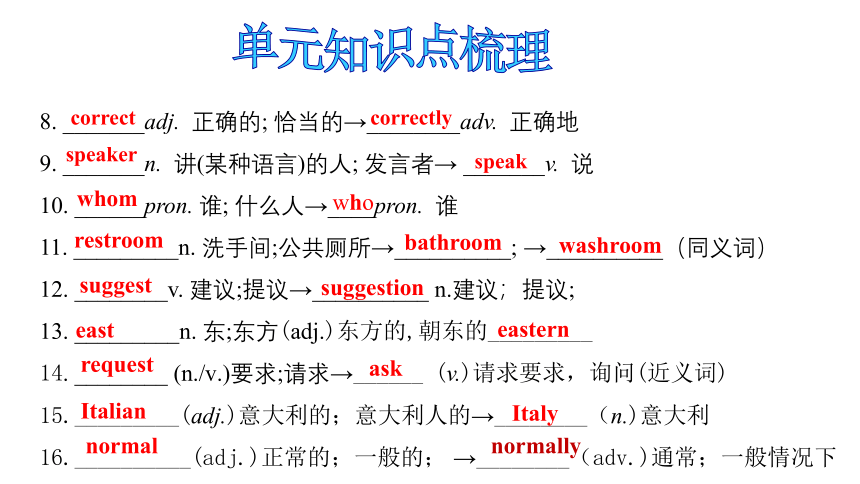
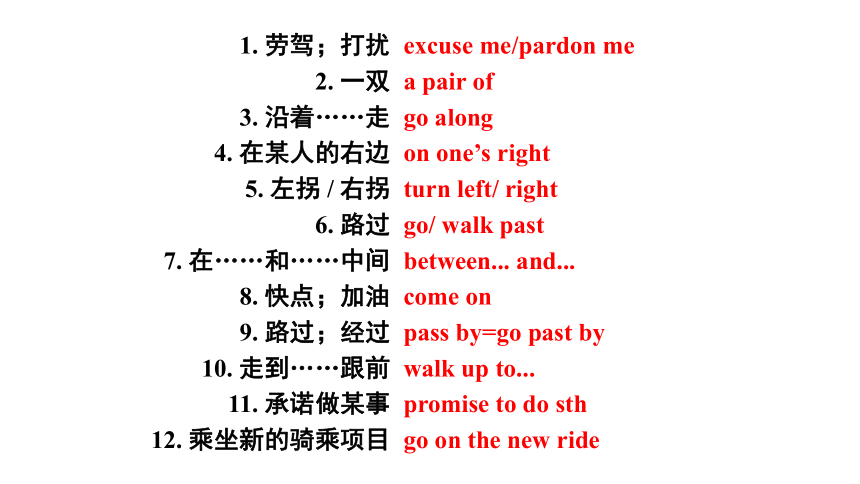
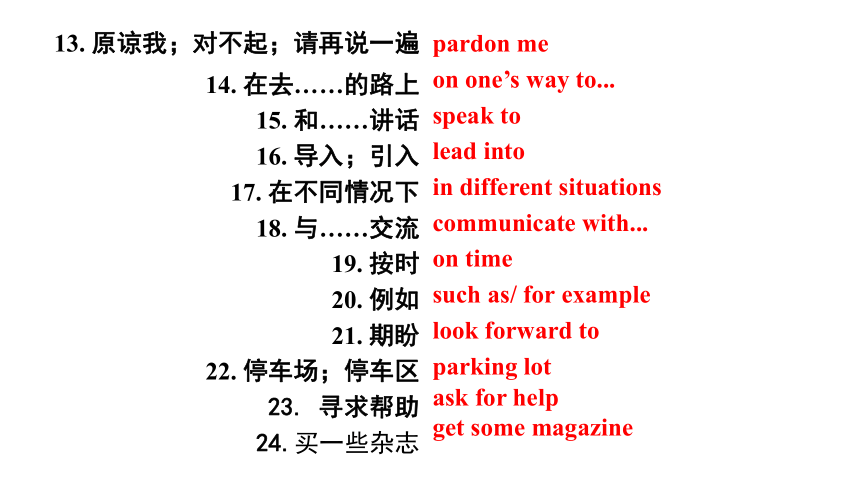
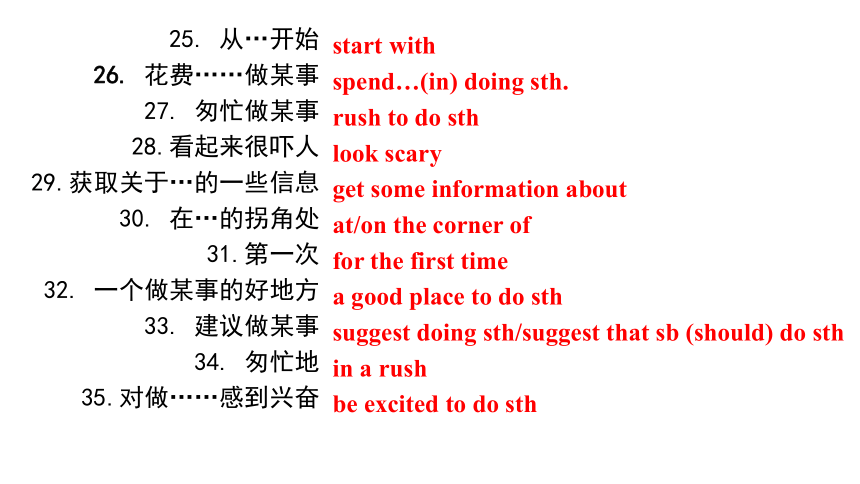
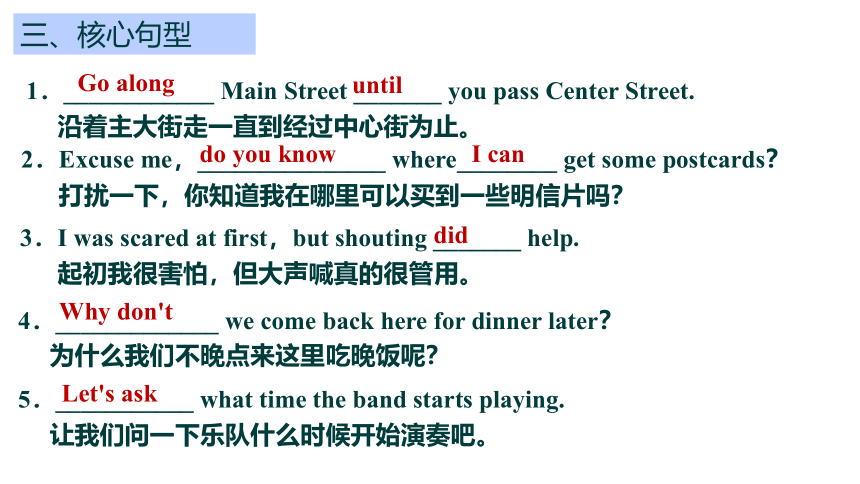

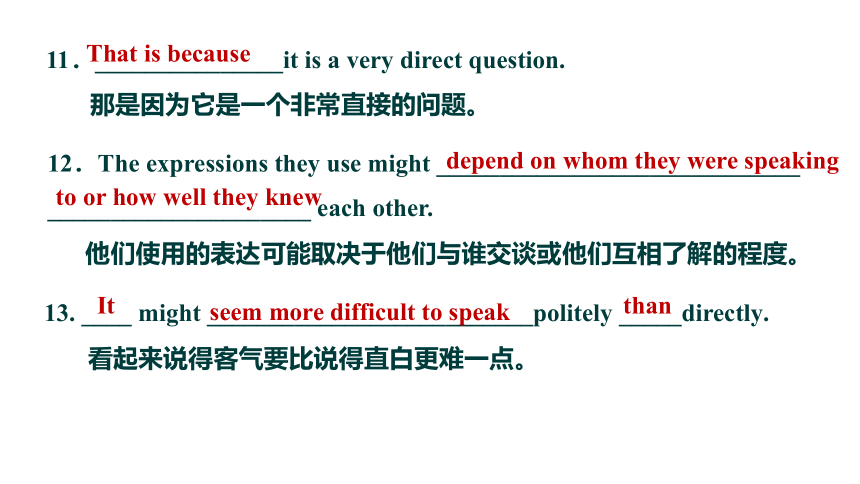
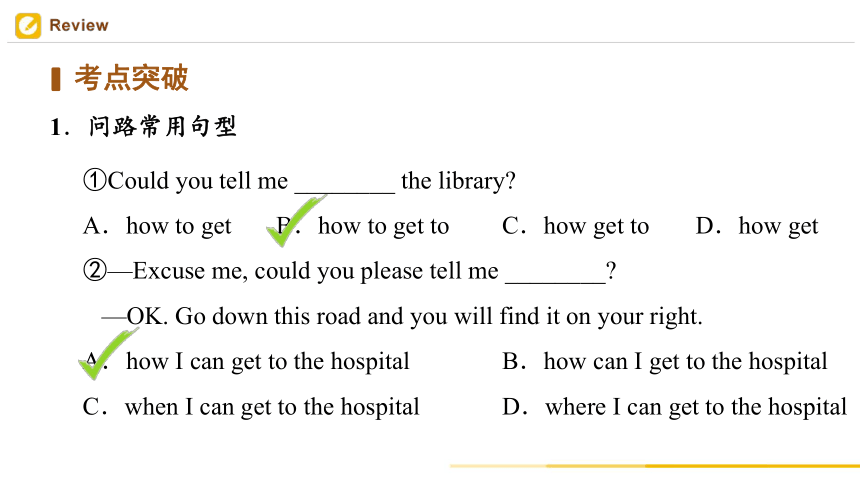
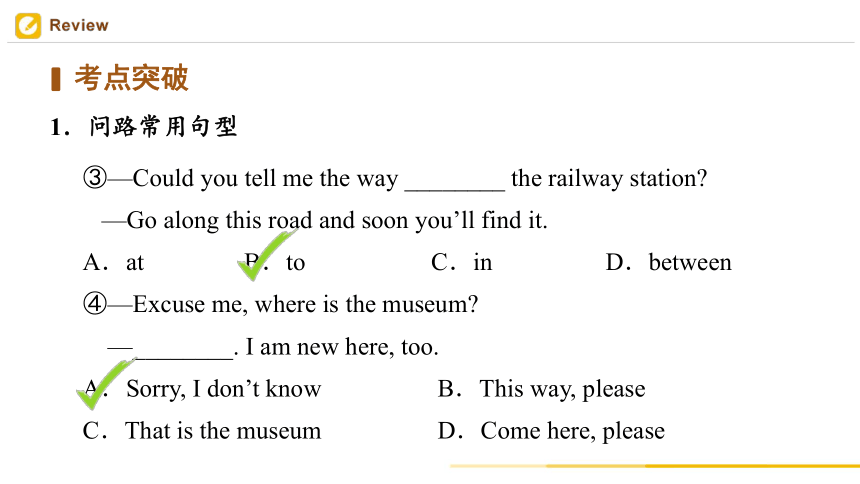
文档简介
(共46张PPT)
Revision of Unit 3
话题梳理
Description words:
big, interesting, clean, quiet, fascinating, beautiful, safe, convenient, etc.
Structures:
①A: Excuse me, do you know where I can buy some medicine
B: Sure. There is a supermarket down the street.
②A: Could you please tell me how to get to the post office
B: sorry, I am not sure how to get there.
Public places:
amusement park, restroom, restaurant, subway, bookstore, flower store, supermarket, mall, etc.
Daily activities:
get some money, get some information about the town, get some magazines/a pair of shoes, buy a newspaper, buy some stamps, park a car, go to a museum, etc.
Getting around
1. ______n. 中心→___________adj. 中心的
2. __________adj. 迷人的; 极有吸引力的→___________adj. 着迷的; 被深深吸引的
3. __________adj. 不昂贵的→ _________adj.昂贵的→ _______adj. 便宜的(同义词)
4. __________adj. 不拥挤的; 人少的→________adj. 拥挤的→ ______ n. 人群
5. __________adj. 便利的; 方便的→___________ adj. 不便利的; 不方便的
→___________ n. 便利;方便
6. ______adj. 有礼貌的→_________adv. 礼貌地; 客气地 →_________adj. 没礼貌的
→___________adv. 无礼地
7. _______adj. 直接的; 直率的→__________n. 方向; 方位;
center
central
fascinating
fascinated
inexpensive
expensive
uncrowded
impolite
impolitely
direct
direction
crowded
convenient
inconvenient
polite
politely
单元知识点梳理
cheap
convenience
crowd
导演;部门负责人(n.)_______
→_________(adv.)直接地
director
directly
8. _______adj. 正确的; 恰当的→________adv. 正确地
9. _______n. 讲(某种语言)的人; 发言者→ _______v. 说
10. ______pron. 谁; 什么人→____pron. 谁
11. _________n. 洗手间;公共厕所→__________; →__________(同义词)
12. ________v. 建议;提议→__________ n.建议;提议;
13. _________n. 东;东方(adj.)东方的,朝东的_________
14. ________ (n./v.)要求;请求→______ (v.)请求要求,询问(近义词)
15._________(adj.)意大利的;意大利人的→________(n.)意大利
16.__________(adj.)正常的;一般的; →________(adv.)通常;一般情况下
whom
who
restroom
bathroom
washroom
suggestion
suggest
east
eastern
request
ask
Italian
Italy
correct
correctly
speaker
speak
单元知识点梳理
normal
normally
1. 劳驾;打扰
2. 一双
3. 沿着……走
4. 在某人的右边
5. 左拐 / 右拐
6. 路过
7. 在……和……中间
8. 快点;加油
9. 路过;经过
10. 走到……跟前
11. 承诺做某事
12. 乘坐新的骑乘项目
excuse me/pardon me
a pair of
go along
on one’s right
turn left/ right
go/ walk past
between... and...
come on
pass by=go past by
walk up to...
promise to do sth
go on the new ride
13. 原谅我;对不起;请再说一遍
14. 在去……的路上
15. 和……讲话
16. 导入;引入
17. 在不同情况下
18. 与……交流
19. 按时
20. 例如
21. 期盼
22. 停车场;停车区
23. 寻求帮助
24.买一些杂志
pardon me
on one’s way to...
speak to
lead into
in different situations
communicate with...
on time
such as/ for example
look forward to
parking lot
ask for help
get some magazine
25. 从…开始
26. 花费……做某事
27. 匆忙做某事
28.看起来很吓人
29.获取关于…的一些信息
30. 在…的拐角处
31.第一次
32. 一个做某事的好地方
33. 建议做某事
34. 匆忙地
35.对做……感到兴奋
start with
spend…(in) doing sth.
rush to do sth
look scary
get some information about
at/on the corner of
for the first time
a good place to do sth
suggest doing sth/suggest that sb (should) do sth
in a rush
be excited to do sth
三、核心句型
1.____________ Main Street _______ you pass Center Street.
沿着主大街走一直到经过中心街为止。
Go along
until
2.Excuse me,_______________ where________ get some postcards?
打扰一下,你知道我在哪里可以买到一些明信片吗?
do you know
I can
3.I was scared at first,but shouting _______ help.
起初我很害怕,但大声喊真的很管用。
4._____________ we come back here for dinner later?
为什么我们不晚点来这里吃晚饭呢?
5.___________ what time the band starts playing.
让我们问一下乐队什么时候开始演奏吧。
did
Why don't
Let's ask
6.I ______________________________ go next.
我想知道我们接下来去哪里。
7.______________________ tell me ________________ the post office?
问您能告诉我怎样去邮局吗?
8.____________,do you know if there's a restaurant around here?
打扰一下,你知道这附近有餐厅吗?
wonder where we should
Could you please
how to get to
Pardon me
9.Can you tell me where there's __________________?
你能告诉我哪里有可以吃东西的好地方吗?
10.When you visit a foreign country, ______________________how to ask for help politely.
当你去国外旅游时,知道如何礼貌地寻求帮助是很重要的。
a good place to eat
it is important to know
11._______________it is a very direct question.
那是因为它是一个非常直接的问题。
12.The expressions they use might _____________________________
_____________________ each other.
他们使用的表达可能取决于他们与谁交谈或他们互相了解的程度。
13. ____ might __________________________politely _____directly.
看起来说得客气要比说得直白更难一点。
That is because
depend on whom they were speaking
to or how well they knew
It
seem more difficult to speak
than
①Could you tell me ________ the library
A.how to get B.how to get to C.how get to D.how get
②—Excuse me, could you please tell me ________
—OK. Go down this road and you will find it on your right.
A.how I can get to the hospital B.how can I get to the hospital
C.when I can get to the hospital D.where I can get to the hospital
考点突破
1.问路常用句型
③—Could you tell me the way ________ the railway station
—Go along this road and soon you’ll find it.
A.at B.to C.in D.between
④—Excuse me, where is the museum
—________. I am new here, too.
A.Sorry, I don’t know B.This way, please
C.That is the museum D.Come here, please
考点突破
1.问路常用句型
考点突破
1.问路常用句型
知识复现
(1)问路的常用句型:
①Excuse me, could/can you please tell me how to get to ...
=Excuse me, could/can you please tell me how I can get to ...
②Excuse me, could/can you please tell me the way to ...
③Excuse me, could/can you please tell me where ... is
④Excuse me, do you know where/how ...
⑤Excuse me, where’s ..., please
考点突破
1.问路常用句型
知识复现
(2)指路的常用表达:
①Sure, go straight and turn left.
②Take the second turning on the right.
③Turn left at the third turning.
④You will find it on your left/right.
注意:如果不知道,可以说“Sorry, I don’t know.”。
①请你帮我搬一下这个大箱子好吗?
________ you ________ ________ me carry this big box
②Could you please ________ TV now I’m studying for my test.
A.not watch B.not to watch
C.don’t watch D.can’t watch
考点突破
2.Could you please ...
Could please help
③—Helen, could you please water the flowers in my garden
—________. They are so lovely.
A.That’s too bad B.With pleasure
C.You’re welcome D.I’m afraid not
④—Could you please do the dishes
—________. I cut my finger and I’m trying not to get it wet.
A.Yes, sure B.No problem
C.Sorry, I’m afraid I can’t D.That would be fine
考点突破
2.Could you please ...
知识复现
(1) Could you please ... 意为“请你……好吗?”,是有礼貌地提出请求的交际用语,please 后接动词原形,其否定结构为 Could you please not ... 意为“请你不要……好吗?”,not 后接动词原形。
could 此处表示委婉的语气,并不是 can 的过去式。
考点突破
2.Could you please ...
知识复现
(2)“Could you please … ”句型的常用答语
考点突破
2.Could you please ...
Sure. / Of course. / Certainly. / No problem. / With pleasure. / ...
Sorry, (I’m afraid) I can’t. / Sorry, I’d love/like to, but I ...
肯定回答
否定回答
①I waited ________ they finished talking.
A.until B.if C.because D.unless
②Some people won’t realize the importance of their friendship
________ they lose it.
A.after B.when C.until D.as
考点突破
3.until
③Jenny didn’t go to bed ________ her mother came home last night.
A.as soon as B.if C.while D.until
④Don’t get off the bus until it ________.
A.will stop B.stop C.stopped D.stops
考点突破
3.until
考点突破
3.until
知识复现
(1)当 until 为连词用于肯定句时,意为“直到……为止”。主句的谓语动词必须是延续性动词,表示动作或状态一直延续到 until 所表示的时间为止。
(2)当 until 为连词用于否定句时,构成 not ... until ... 结构,意为“直到……才……”。主句的谓语动词通常是非延续性动词,表示动作或状态直到 until 所表示的时间才发生。
考点突破
3.until
知识复现
(3)当 until 为连词构成 not ... until ... 结构时,如果主句为一般将来时、祈使句或谓语部分含有情态动词时,从句通常用一般现在时。
注意: until 的同义词为 till,但 until 可以放在句首,而 till 不能。
e.g. Until now I have always lived alone.
直到现在,我一直独自生活。
①—Open the window please, Mike.
—_________ I didn’t hear what you said.
A.Why B.Really C.Pardon D.What
②我违反了校规,希望你能原谅我。
I hope you can ________ ________ ________ breaking the school rules.
③—________, could you tell me where to park my car
—Sure. There’s an underground parking lot over there.
A.Let it go B.Pardon me C.I’m sorry D.On the way
考点突破
4.pardon
pardon me for
考点突破
4.pardon
知识复现
(1)pardon 用作感叹词,意为“请再说一遍”,表示没有听清对方的话,希望对方重复一遍,读时用升调,相当于pardon me 或 I beg your pardon。
(2)pardon 用作动词,意为“原谅”,常见用法有:
pardon sb. for (doing) sth.,意为“原谅/宽恕某人(做)某事”。
①We talked about the problem and suggested ________ there by car.
A.go B.going C.went D.gone
②My English teacher always gives me some useful __________ (suggest) about English learning.
③He suggested that we __________ (do) it at once.
考点突破
5.suggest
suggestions
(should) do
考点突破
5.suggest
知识复现
(1)suggest 为及物动词,意为“建议;提议”,其名词形式为 suggestion,为可数名词。
(2)suggest 当“建议”讲时,可以接动词-ing形式做宾语,也可以接 that 引导的宾语从句,从句的谓语为“should+动词原形”,其中 should 可以省略。
①It’s very convenient and cheap for us ______ a bus.
A.take B.to take C.taking D.took
②It is ______ for me to go shopping. There is a new supermarket near my home.
A.difficult B.important C.convenient D.impossible
③I keep my book near my desk for ___________ (convenient).
考点突破
6.convenient
convenience
考点突破
6.convenient
知识复现
(1) convenient 为形容词,意为“便利的;方便的”,其主语不能是表示人的词,常用于句型 It’s convenient for sb. to do sth.,意为“对某人来说做某事是方便的”。
(2)convenient 的名词形式为 convenience,是不可数名词,意为“方便;便利”。
①They received hundreds of requests ________ more information.
A.of B.about C.for D.to
②他们要求他立刻去那儿。
They _________ him _______ ________ there at once.
③The doctor requested that the patient ___________ (stay) in bed for two weeks.
考点突破
7.request
requested to go
(should) stay
考点突破
7.request
知识复现
(1)request 用作名词,意为“要求;请求”,是可数名词,多指对某事物所提出的礼貌或正式的恳请。当该词之后接具体内容表示哪方面的请求时,常用介词 for 与之搭配。
(2)request 用作动词,意为“要求;请求”。常见用法有:
①request sb. to do sth.意为“请求某人做某事”。
②request+that 从句,从句的谓语为“should+动词原形”,其中 should 可以省略。
rush此处用作动词,意为“仓促;急促”。
rush to do sth.意为“赶紧/抢着做某事”;rush to…意为“冲/奔向……”。
He stood up and rushed to the door. 他站起来向门口冲去。
考点突破
8. You don't need to rush!你不需要着急!
【拓展延伸】
rush用作名词,意为“匆忙;繁忙”
in a rush“匆忙地”; rush hour“(交通)高峰期;拥挤时刻”
If you go now, you're likely to hit the rush hour.
你要是现在走,很有可能会赶上交通高峰期。
9. You go east along this street…你沿着这条街向东走……
east adj.东方的;东部的 adv.向东;朝东 n.东;东方
east作名词时,可以和介词in,on,to搭配,构成表示方位的短语。
in the east of 表示在一定范围以内的东部。
on the east of 表示在一定范围以外的东部,相邻或接壤。
to the east of 表示在一定范围以外的东部,不相邻。
考点突破
【拓展延伸】
eastern adj. 东方的;western adj.西方的;
southern adj.南方的;northern adj.北方的
Lianyungang, an eastern seaside city, is attractive.
连云港是个东部海滨城市,非常迷人。
考点突破
…and the clerk tells her to go to the corner of Market and Middle Streets.
……工作人员告诉她去市场大街和中心大街交汇的拐角处。
on/at the corner意为“在拐角处”。
【拓展延伸】
in the corner 在拐角处,指的是在室内。
at the corner 在拐角处,一般指在室外。
on the corner 与 at the corner 类似; 也指在某个物体表面的拐角处。如: on the corner of the table。
考点突破
On their way to Water City Restaurant,Alice and He Wei pass by Uncle Bob's.
在他们去水城餐馆的路上,爱丽斯和何伟路过鲍勃叔叔的餐馆。
go past=pass by,意为“经过;路过”。其中 past为介词,意为“从……旁边过去”。
Go past our school=Pass by our school. 经过我们学校。
【易混辨析】past,over,across与through
考点突破
past 超过;从……旁边经过 表示时间上的“超过”或空间上的“经过”。
over 从……上方跨越而过 表示动作发生在物体的上方。
across 横穿;越过 表示动作是在某一物体的表面进行的,强调从一端到另一端。
through 穿过;越过 表示动作是在某一空间内进行的,强调从内部穿过。
①—Did you notice ______ in his office —Yes, he was going over our homework.
A.what Mr. Li was doing B.how was Mr. Li doing
C.how Mr. Li was doing D.what Mr. Li is doing
②To my surprise, my grandpa suddenly asked me ______ on QQ.
A.that he could get the “red packets”
B.how he could get the “red packets”
C.what could he get the “red packets”
D.whether could he get the “red packets”
语法突破
特殊疑问词引导的宾语从句
③“Why does Jim send flowers to Mrs. Grey every September ” he wondered.(改为含宾语从句的复合句)
He wondered ______ ______ ______ flowers to Mrs. Grey every September.
④Could you tell me how I can get to Central Park (改为简单句)
Could you tell me ______ ______ ______ to Central Park
语法突破
特殊疑问词引导的宾语从句
why Jim sent
how to get
特殊疑问词引导的宾语从句
语法突破
知识复现
(1)特殊疑问词引导的宾语从句
当宾语从句是特殊疑问句时,特殊疑问词就是引导词,这时特殊疑问词不可省略,而且宾语从句要用陈述语序,即“特殊疑问词+主语+谓语+其他”。
特殊疑问词引导的宾语从句
语法突破
知识复现
①疑问代词引导的宾语从句
疑问代词 what、who、whom、which、whose 可引导宾语从句,它们在从句中作主语、宾语、定语或表语等。
②疑问副词引导的宾语从句
疑问副词 when、where、how、why 等引导宾语从句时,它们在从句中作状语。
特殊疑问词引导的宾语从句
语法突破
知识复现
(2)含有宾语从句的复合句与简单句的转换
在含有特殊疑问词引导的宾语从句的主从复合句中,若主句的主语或宾语与从句的主语一致,则宾语从句可以变成“特殊疑问词+动词不定式”的形式。
e.g. I don’t know how I should do it next.
=I don’t know how to do it next.
我不知道下一步应该怎样做。
特殊疑问词引导的宾语从句
语法突破
知识复现
(3)改写宾语从句的三个步骤
①确定从句的引导词
宾语从句的引导词要根据原句中的句式来确定,其对应情况如下表:
原句子的句式 从句引导词
陈述句 that
一般疑问句 if或whether
特殊疑问句 原特殊疑问词(疑问代词或疑问副词)
特殊疑问词引导的宾语从句
语法突破
知识复现
②确保从句语序正确
无论原句是何种句式,改为宾语从句后,应确保从句的语序为陈述语序。
③确定从句的时态
A. 如果主句为一般现在时,从句时态不变(与原句保持一致)。
B. 如果主句为一般过去时,从句时态应改为相应的过去时。
C. 如果从句内容为客观真理或自然规律,无论主句为何种时态,从句的时态均为一般现在时。
特殊疑问词引导的宾语从句
语法突破
知识复现
注意:
当 who 或 which对主语提问时,宾语从句的语序不变。
Tom will give a report tomorrow.
→Do you know who will give a report tomorrow
话题梳理
Description words
Structures
Public places
Daily activities
Getting around
Lisa 和好友 Linda 约好周六中午12点到意大利餐厅吃饭,但是 Linda 对约定地点不是很熟。请参考下面的路线图,完成 Lisa 写给 Linda 的电子邮件。
Dear Linda,
I’m so glad that we’ll meet in the Italian restaurant. Now let me tell you how to get to the restaurant. ______________________________________________________________________________________________________________________________________________________
It’s said that the food there is very delicious. Remember to get to the restaurant at 12:00 this Saturday. I’ll wait for you there.
Yours,
Lisa
Revision of Unit 3
话题梳理
Description words:
big, interesting, clean, quiet, fascinating, beautiful, safe, convenient, etc.
Structures:
①A: Excuse me, do you know where I can buy some medicine
B: Sure. There is a supermarket down the street.
②A: Could you please tell me how to get to the post office
B: sorry, I am not sure how to get there.
Public places:
amusement park, restroom, restaurant, subway, bookstore, flower store, supermarket, mall, etc.
Daily activities:
get some money, get some information about the town, get some magazines/a pair of shoes, buy a newspaper, buy some stamps, park a car, go to a museum, etc.
Getting around
1. ______n. 中心→___________adj. 中心的
2. __________adj. 迷人的; 极有吸引力的→___________adj. 着迷的; 被深深吸引的
3. __________adj. 不昂贵的→ _________adj.昂贵的→ _______adj. 便宜的(同义词)
4. __________adj. 不拥挤的; 人少的→________adj. 拥挤的→ ______ n. 人群
5. __________adj. 便利的; 方便的→___________ adj. 不便利的; 不方便的
→___________ n. 便利;方便
6. ______adj. 有礼貌的→_________adv. 礼貌地; 客气地 →_________adj. 没礼貌的
→___________adv. 无礼地
7. _______adj. 直接的; 直率的→__________n. 方向; 方位;
center
central
fascinating
fascinated
inexpensive
expensive
uncrowded
impolite
impolitely
direct
direction
crowded
convenient
inconvenient
polite
politely
单元知识点梳理
cheap
convenience
crowd
导演;部门负责人(n.)_______
→_________(adv.)直接地
director
directly
8. _______adj. 正确的; 恰当的→________adv. 正确地
9. _______n. 讲(某种语言)的人; 发言者→ _______v. 说
10. ______pron. 谁; 什么人→____pron. 谁
11. _________n. 洗手间;公共厕所→__________; →__________(同义词)
12. ________v. 建议;提议→__________ n.建议;提议;
13. _________n. 东;东方(adj.)东方的,朝东的_________
14. ________ (n./v.)要求;请求→______ (v.)请求要求,询问(近义词)
15._________(adj.)意大利的;意大利人的→________(n.)意大利
16.__________(adj.)正常的;一般的; →________(adv.)通常;一般情况下
whom
who
restroom
bathroom
washroom
suggestion
suggest
east
eastern
request
ask
Italian
Italy
correct
correctly
speaker
speak
单元知识点梳理
normal
normally
1. 劳驾;打扰
2. 一双
3. 沿着……走
4. 在某人的右边
5. 左拐 / 右拐
6. 路过
7. 在……和……中间
8. 快点;加油
9. 路过;经过
10. 走到……跟前
11. 承诺做某事
12. 乘坐新的骑乘项目
excuse me/pardon me
a pair of
go along
on one’s right
turn left/ right
go/ walk past
between... and...
come on
pass by=go past by
walk up to...
promise to do sth
go on the new ride
13. 原谅我;对不起;请再说一遍
14. 在去……的路上
15. 和……讲话
16. 导入;引入
17. 在不同情况下
18. 与……交流
19. 按时
20. 例如
21. 期盼
22. 停车场;停车区
23. 寻求帮助
24.买一些杂志
pardon me
on one’s way to...
speak to
lead into
in different situations
communicate with...
on time
such as/ for example
look forward to
parking lot
ask for help
get some magazine
25. 从…开始
26. 花费……做某事
27. 匆忙做某事
28.看起来很吓人
29.获取关于…的一些信息
30. 在…的拐角处
31.第一次
32. 一个做某事的好地方
33. 建议做某事
34. 匆忙地
35.对做……感到兴奋
start with
spend…(in) doing sth.
rush to do sth
look scary
get some information about
at/on the corner of
for the first time
a good place to do sth
suggest doing sth/suggest that sb (should) do sth
in a rush
be excited to do sth
三、核心句型
1.____________ Main Street _______ you pass Center Street.
沿着主大街走一直到经过中心街为止。
Go along
until
2.Excuse me,_______________ where________ get some postcards?
打扰一下,你知道我在哪里可以买到一些明信片吗?
do you know
I can
3.I was scared at first,but shouting _______ help.
起初我很害怕,但大声喊真的很管用。
4._____________ we come back here for dinner later?
为什么我们不晚点来这里吃晚饭呢?
5.___________ what time the band starts playing.
让我们问一下乐队什么时候开始演奏吧。
did
Why don't
Let's ask
6.I ______________________________ go next.
我想知道我们接下来去哪里。
7.______________________ tell me ________________ the post office?
问您能告诉我怎样去邮局吗?
8.____________,do you know if there's a restaurant around here?
打扰一下,你知道这附近有餐厅吗?
wonder where we should
Could you please
how to get to
Pardon me
9.Can you tell me where there's __________________?
你能告诉我哪里有可以吃东西的好地方吗?
10.When you visit a foreign country, ______________________how to ask for help politely.
当你去国外旅游时,知道如何礼貌地寻求帮助是很重要的。
a good place to eat
it is important to know
11._______________it is a very direct question.
那是因为它是一个非常直接的问题。
12.The expressions they use might _____________________________
_____________________ each other.
他们使用的表达可能取决于他们与谁交谈或他们互相了解的程度。
13. ____ might __________________________politely _____directly.
看起来说得客气要比说得直白更难一点。
That is because
depend on whom they were speaking
to or how well they knew
It
seem more difficult to speak
than
①Could you tell me ________ the library
A.how to get B.how to get to C.how get to D.how get
②—Excuse me, could you please tell me ________
—OK. Go down this road and you will find it on your right.
A.how I can get to the hospital B.how can I get to the hospital
C.when I can get to the hospital D.where I can get to the hospital
考点突破
1.问路常用句型
③—Could you tell me the way ________ the railway station
—Go along this road and soon you’ll find it.
A.at B.to C.in D.between
④—Excuse me, where is the museum
—________. I am new here, too.
A.Sorry, I don’t know B.This way, please
C.That is the museum D.Come here, please
考点突破
1.问路常用句型
考点突破
1.问路常用句型
知识复现
(1)问路的常用句型:
①Excuse me, could/can you please tell me how to get to ...
=Excuse me, could/can you please tell me how I can get to ...
②Excuse me, could/can you please tell me the way to ...
③Excuse me, could/can you please tell me where ... is
④Excuse me, do you know where/how ...
⑤Excuse me, where’s ..., please
考点突破
1.问路常用句型
知识复现
(2)指路的常用表达:
①Sure, go straight and turn left.
②Take the second turning on the right.
③Turn left at the third turning.
④You will find it on your left/right.
注意:如果不知道,可以说“Sorry, I don’t know.”。
①请你帮我搬一下这个大箱子好吗?
________ you ________ ________ me carry this big box
②Could you please ________ TV now I’m studying for my test.
A.not watch B.not to watch
C.don’t watch D.can’t watch
考点突破
2.Could you please ...
Could please help
③—Helen, could you please water the flowers in my garden
—________. They are so lovely.
A.That’s too bad B.With pleasure
C.You’re welcome D.I’m afraid not
④—Could you please do the dishes
—________. I cut my finger and I’m trying not to get it wet.
A.Yes, sure B.No problem
C.Sorry, I’m afraid I can’t D.That would be fine
考点突破
2.Could you please ...
知识复现
(1) Could you please ... 意为“请你……好吗?”,是有礼貌地提出请求的交际用语,please 后接动词原形,其否定结构为 Could you please not ... 意为“请你不要……好吗?”,not 后接动词原形。
could 此处表示委婉的语气,并不是 can 的过去式。
考点突破
2.Could you please ...
知识复现
(2)“Could you please … ”句型的常用答语
考点突破
2.Could you please ...
Sure. / Of course. / Certainly. / No problem. / With pleasure. / ...
Sorry, (I’m afraid) I can’t. / Sorry, I’d love/like to, but I ...
肯定回答
否定回答
①I waited ________ they finished talking.
A.until B.if C.because D.unless
②Some people won’t realize the importance of their friendship
________ they lose it.
A.after B.when C.until D.as
考点突破
3.until
③Jenny didn’t go to bed ________ her mother came home last night.
A.as soon as B.if C.while D.until
④Don’t get off the bus until it ________.
A.will stop B.stop C.stopped D.stops
考点突破
3.until
考点突破
3.until
知识复现
(1)当 until 为连词用于肯定句时,意为“直到……为止”。主句的谓语动词必须是延续性动词,表示动作或状态一直延续到 until 所表示的时间为止。
(2)当 until 为连词用于否定句时,构成 not ... until ... 结构,意为“直到……才……”。主句的谓语动词通常是非延续性动词,表示动作或状态直到 until 所表示的时间才发生。
考点突破
3.until
知识复现
(3)当 until 为连词构成 not ... until ... 结构时,如果主句为一般将来时、祈使句或谓语部分含有情态动词时,从句通常用一般现在时。
注意: until 的同义词为 till,但 until 可以放在句首,而 till 不能。
e.g. Until now I have always lived alone.
直到现在,我一直独自生活。
①—Open the window please, Mike.
—_________ I didn’t hear what you said.
A.Why B.Really C.Pardon D.What
②我违反了校规,希望你能原谅我。
I hope you can ________ ________ ________ breaking the school rules.
③—________, could you tell me where to park my car
—Sure. There’s an underground parking lot over there.
A.Let it go B.Pardon me C.I’m sorry D.On the way
考点突破
4.pardon
pardon me for
考点突破
4.pardon
知识复现
(1)pardon 用作感叹词,意为“请再说一遍”,表示没有听清对方的话,希望对方重复一遍,读时用升调,相当于pardon me 或 I beg your pardon。
(2)pardon 用作动词,意为“原谅”,常见用法有:
pardon sb. for (doing) sth.,意为“原谅/宽恕某人(做)某事”。
①We talked about the problem and suggested ________ there by car.
A.go B.going C.went D.gone
②My English teacher always gives me some useful __________ (suggest) about English learning.
③He suggested that we __________ (do) it at once.
考点突破
5.suggest
suggestions
(should) do
考点突破
5.suggest
知识复现
(1)suggest 为及物动词,意为“建议;提议”,其名词形式为 suggestion,为可数名词。
(2)suggest 当“建议”讲时,可以接动词-ing形式做宾语,也可以接 that 引导的宾语从句,从句的谓语为“should+动词原形”,其中 should 可以省略。
①It’s very convenient and cheap for us ______ a bus.
A.take B.to take C.taking D.took
②It is ______ for me to go shopping. There is a new supermarket near my home.
A.difficult B.important C.convenient D.impossible
③I keep my book near my desk for ___________ (convenient).
考点突破
6.convenient
convenience
考点突破
6.convenient
知识复现
(1) convenient 为形容词,意为“便利的;方便的”,其主语不能是表示人的词,常用于句型 It’s convenient for sb. to do sth.,意为“对某人来说做某事是方便的”。
(2)convenient 的名词形式为 convenience,是不可数名词,意为“方便;便利”。
①They received hundreds of requests ________ more information.
A.of B.about C.for D.to
②他们要求他立刻去那儿。
They _________ him _______ ________ there at once.
③The doctor requested that the patient ___________ (stay) in bed for two weeks.
考点突破
7.request
requested to go
(should) stay
考点突破
7.request
知识复现
(1)request 用作名词,意为“要求;请求”,是可数名词,多指对某事物所提出的礼貌或正式的恳请。当该词之后接具体内容表示哪方面的请求时,常用介词 for 与之搭配。
(2)request 用作动词,意为“要求;请求”。常见用法有:
①request sb. to do sth.意为“请求某人做某事”。
②request+that 从句,从句的谓语为“should+动词原形”,其中 should 可以省略。
rush此处用作动词,意为“仓促;急促”。
rush to do sth.意为“赶紧/抢着做某事”;rush to…意为“冲/奔向……”。
He stood up and rushed to the door. 他站起来向门口冲去。
考点突破
8. You don't need to rush!你不需要着急!
【拓展延伸】
rush用作名词,意为“匆忙;繁忙”
in a rush“匆忙地”; rush hour“(交通)高峰期;拥挤时刻”
If you go now, you're likely to hit the rush hour.
你要是现在走,很有可能会赶上交通高峰期。
9. You go east along this street…你沿着这条街向东走……
east adj.东方的;东部的 adv.向东;朝东 n.东;东方
east作名词时,可以和介词in,on,to搭配,构成表示方位的短语。
in the east of 表示在一定范围以内的东部。
on the east of 表示在一定范围以外的东部,相邻或接壤。
to the east of 表示在一定范围以外的东部,不相邻。
考点突破
【拓展延伸】
eastern adj. 东方的;western adj.西方的;
southern adj.南方的;northern adj.北方的
Lianyungang, an eastern seaside city, is attractive.
连云港是个东部海滨城市,非常迷人。
考点突破
…and the clerk tells her to go to the corner of Market and Middle Streets.
……工作人员告诉她去市场大街和中心大街交汇的拐角处。
on/at the corner意为“在拐角处”。
【拓展延伸】
in the corner 在拐角处,指的是在室内。
at the corner 在拐角处,一般指在室外。
on the corner 与 at the corner 类似; 也指在某个物体表面的拐角处。如: on the corner of the table。
考点突破
On their way to Water City Restaurant,Alice and He Wei pass by Uncle Bob's.
在他们去水城餐馆的路上,爱丽斯和何伟路过鲍勃叔叔的餐馆。
go past=pass by,意为“经过;路过”。其中 past为介词,意为“从……旁边过去”。
Go past our school=Pass by our school. 经过我们学校。
【易混辨析】past,over,across与through
考点突破
past 超过;从……旁边经过 表示时间上的“超过”或空间上的“经过”。
over 从……上方跨越而过 表示动作发生在物体的上方。
across 横穿;越过 表示动作是在某一物体的表面进行的,强调从一端到另一端。
through 穿过;越过 表示动作是在某一空间内进行的,强调从内部穿过。
①—Did you notice ______ in his office —Yes, he was going over our homework.
A.what Mr. Li was doing B.how was Mr. Li doing
C.how Mr. Li was doing D.what Mr. Li is doing
②To my surprise, my grandpa suddenly asked me ______ on QQ.
A.that he could get the “red packets”
B.how he could get the “red packets”
C.what could he get the “red packets”
D.whether could he get the “red packets”
语法突破
特殊疑问词引导的宾语从句
③“Why does Jim send flowers to Mrs. Grey every September ” he wondered.(改为含宾语从句的复合句)
He wondered ______ ______ ______ flowers to Mrs. Grey every September.
④Could you tell me how I can get to Central Park (改为简单句)
Could you tell me ______ ______ ______ to Central Park
语法突破
特殊疑问词引导的宾语从句
why Jim sent
how to get
特殊疑问词引导的宾语从句
语法突破
知识复现
(1)特殊疑问词引导的宾语从句
当宾语从句是特殊疑问句时,特殊疑问词就是引导词,这时特殊疑问词不可省略,而且宾语从句要用陈述语序,即“特殊疑问词+主语+谓语+其他”。
特殊疑问词引导的宾语从句
语法突破
知识复现
①疑问代词引导的宾语从句
疑问代词 what、who、whom、which、whose 可引导宾语从句,它们在从句中作主语、宾语、定语或表语等。
②疑问副词引导的宾语从句
疑问副词 when、where、how、why 等引导宾语从句时,它们在从句中作状语。
特殊疑问词引导的宾语从句
语法突破
知识复现
(2)含有宾语从句的复合句与简单句的转换
在含有特殊疑问词引导的宾语从句的主从复合句中,若主句的主语或宾语与从句的主语一致,则宾语从句可以变成“特殊疑问词+动词不定式”的形式。
e.g. I don’t know how I should do it next.
=I don’t know how to do it next.
我不知道下一步应该怎样做。
特殊疑问词引导的宾语从句
语法突破
知识复现
(3)改写宾语从句的三个步骤
①确定从句的引导词
宾语从句的引导词要根据原句中的句式来确定,其对应情况如下表:
原句子的句式 从句引导词
陈述句 that
一般疑问句 if或whether
特殊疑问句 原特殊疑问词(疑问代词或疑问副词)
特殊疑问词引导的宾语从句
语法突破
知识复现
②确保从句语序正确
无论原句是何种句式,改为宾语从句后,应确保从句的语序为陈述语序。
③确定从句的时态
A. 如果主句为一般现在时,从句时态不变(与原句保持一致)。
B. 如果主句为一般过去时,从句时态应改为相应的过去时。
C. 如果从句内容为客观真理或自然规律,无论主句为何种时态,从句的时态均为一般现在时。
特殊疑问词引导的宾语从句
语法突破
知识复现
注意:
当 who 或 which对主语提问时,宾语从句的语序不变。
Tom will give a report tomorrow.
→Do you know who will give a report tomorrow
话题梳理
Description words
Structures
Public places
Daily activities
Getting around
Lisa 和好友 Linda 约好周六中午12点到意大利餐厅吃饭,但是 Linda 对约定地点不是很熟。请参考下面的路线图,完成 Lisa 写给 Linda 的电子邮件。
Dear Linda,
I’m so glad that we’ll meet in the Italian restaurant. Now let me tell you how to get to the restaurant. ______________________________________________________________________________________________________________________________________________________
It’s said that the food there is very delicious. Remember to get to the restaurant at 12:00 this Saturday. I’ll wait for you there.
Yours,
Lisa
同课章节目录
- Unit 1 How can we become good learners.
- Section A
- Section B
- Unit 2 I think that mooncakes are delicious!
- Section A
- Section B
- Unit 3 Could you please tell me where the restroom
- Section A
- Section B
- Unit 4 I used to be afraid of the dark.
- Section A
- Section B
- Unit 5 What are the shirts made of?
- Section A
- Section B
- Review of Units 1-5
- Unit 6 When was it invented?
- Section A
- Section B
- Unit 7 Teenagers should be allowed to choose their
- Section A
- Section B
- Unit 8 It must belong to Carla.
- Section A
- Section B
- Unit 9 I like music that I can dance to.
- Section A
- Section B
- Unit 10 You're supposed to shake hands.
- Section A
- Section B
- Review of Units 6-10
- Unit 11 Sad movies make me cry.
- Section A
- Section B
- Unit 12 Life is full of the unexpected
- Section A
- Section B
- Unit 13 We're trying to save the earth!
- Section A
- Section B
- Unit 14 I remember meeting all of you in Grade 7.
- Section A
- Section B
- Review of Units 11-14
